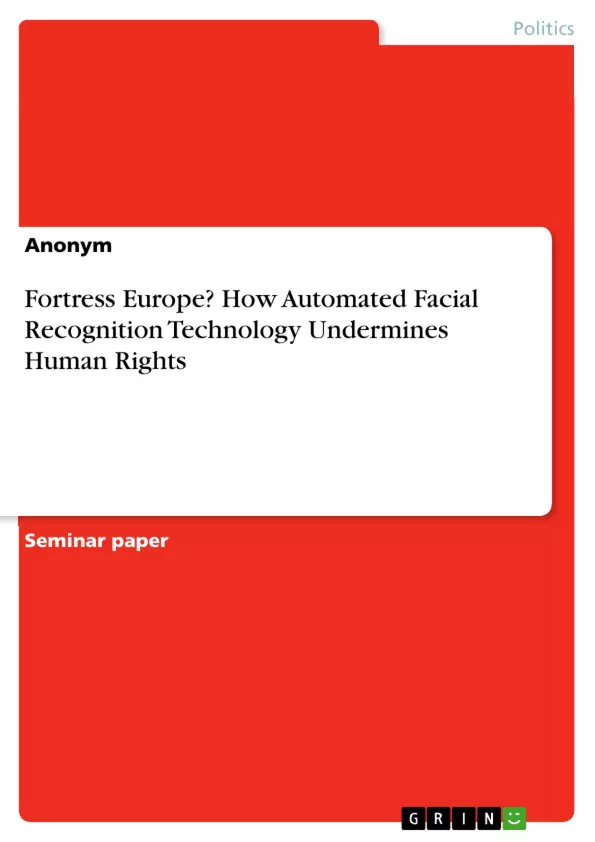The aim of this paper is to investigate to what extent the EU's strategy for securing its borders aligns with the primacy of human rights and what impact European migration policy measures have on the EU’s legitimacy.
In order to answer this question, a systematic literature review was carried out based on Schmidt's (2013) classification of legitimacy into input, output, and throughput and taking into account the concept of human rights of the EU. Input legitimacy was examined in the context of the border governance of the Schengen border regime, output legitimacy was judged in the context of the EUROSUR policies, especially the use of AFRT at borders and the refugee distribution scheme of the Dublin Convention. Throughput legitimacy was analyzed taking into account the criterion of accountability within the privatization of the border management. The examination of these aspects has shown that the EU policy on migration is highly contradictory and deficient in all areas of legitimacy. There are no uniform ways of acting, nation-state interests remain dominant, policies conflict with human rights, there is no clarity about who is accountable for certain measures. On the basis of the insights gained, five recommendations for action have been drawn up for the EU Commission, which should contribute to coping with this crisis.
Since the introduction of the Schengen Agreement in 1985, the task of border security has shifted from national borders to the European external borders. Although this agreement has led to greater European integration and to a certain degree to a common European identity, opinions are divided on how to deal with humans outside of the Schengen borders. With the increasing migration flows towards Europe since the Syrian Conflict in 2011 and the ensuing EU policies, the EU has increasingly become a protected fortress, which recognizes migrants as a threat. At the same time, the EU presents itself as a protector of human rights.
Inhaltsverzeichnis (Table of Contents)
- Introduction
- Methodological section
- Background information: Facial Recognition Technology in the European Border Management
- Theoretical section
- Legitimacy in the EU
- Concept of Human Rights (protection) of the EU and the European identity
- Empirical analysis
- Input legitimacy: Border governance in the Schengen border regime
- Output legitimacy: human rights violation and ineffective output policies
- Throughput legitimacy: Accountability within the process of privatization of border management
- Conclusion
Zielsetzung und Themenschwerpunkte (Objectives and Key Themes)
This paper investigates the extent to which the EU's strategy for securing its borders aligns with the primacy of human rights and how European migration policy measures impact the EU's legitimacy. It examines the use of automated facial recognition technology (AFRT) at borders and its implications for human rights, analyzing the EU's border management strategy through the lens of legitimacy.
- The impact of the refugee crisis on the legitimacy of the EU's border management.
- The use of AFRT at borders and its implications for human rights.
- The EU's approach to border security and its alignment with human rights principles.
- The concept of legitimacy in the context of the EU's border management.
- The role of the European Border and Coast Guard Agency (Frontex) in managing the EU's external borders.
Zusammenfassung der Kapitel (Chapter Summaries)
The paper begins by providing a historical background on the development of surveillance mechanisms and the use of AFRT in the EU's border management. It then delves into the theoretical framework, discussing the concept of legitimacy based on Schmidt (2013) and the concept of the primacy of human rights in the EU.
The empirical analysis examines input, output, and throughput legitimacy in relation to the EU's border management strategy. Input legitimacy is explored in the context of the Schengen border regime, while output legitimacy is assessed through the lens of human rights violations and the effectiveness of EUROSUR policies, specifically the use of AFRT at borders. Throughput legitimacy is analyzed by examining the criterion of accountability within the privatization of border management.
Schlüsselwörter (Keywords)
The paper focuses on the key themes of border security, human rights, legitimacy, automated facial recognition technology (AFRT), European Union (EU), Schengen Agreement, European Border and Coast Guard Agency (Frontex), EUROSUR, Dublin Convention, and migration crisis.
Frequently Asked Questions
What is "Fortress Europe" in the context of migration?
It refers to the EU's increasingly restrictive border policies since 1985, which aim to secure external borders, often perceiving migrants as a threat while presenting the EU as a protector of human rights.
How does Automated Facial Recognition Technology (AFRT) affect human rights?
The use of AFRT at borders can undermine privacy, lead to discriminatory profiling, and conflict with the primacy of human rights that the EU claims to uphold.
What are the three dimensions of legitimacy examined in the paper?
The paper uses Schmidt's classification: Input legitimacy (border governance), Output legitimacy (effectiveness of policies like EUROSUR), and Throughput legitimacy (accountability and privatization).
What is the role of Frontex in border management?
Frontex is the European Border and Coast Guard Agency responsible for managing the EU's external borders, though its accountability is often questioned due to the privatization of management.
Why is EU migration policy considered contradictory?
Because while the EU promotes itself as a guardian of human rights, its actual policies—such as the Dublin Convention and the use of surveillance technology—often lead to human rights violations and lack uniform accountability.
- Citation du texte
- Anonym (Auteur), 2020, Fortress Europe? How Automated Facial Recognition Technology Undermines Human Rights, Munich, GRIN Verlag, https://www.grin.com/document/945205



